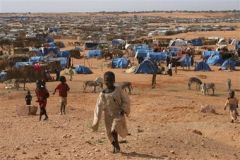In Darfur, some refugees avoid camps
March 14, 2004 (ANKA, Sudan) — With violence high in Darfur’s refugee camps, some of those driven from their homes are choosing to stay away, living in rebel-controlled areas in constant fear of government or militia attack. They struggle to stay alive with little access to outside humanitarian aid.
 Jabr Ali is one of them. On a recent day, the farmer crouched next to a pile of thorns and carefully lifted one branch, pointing to an unexploded bomb that lay stuck in the sand near his mud hut home.
Jabr Ali is one of them. On a recent day, the farmer crouched next to a pile of thorns and carefully lifted one branch, pointing to an unexploded bomb that lay stuck in the sand near his mud hut home.
He had put the pile of thorns around the shell to prevent his 10 children from getting near, and to avoid losing more cattle. More than a dozen cattle had died during the air raid when the bomb was dropped a few weeks earlier. Ali blamed government airplanes.
The mud huts where he and his family live are near to Anka, a once-busy regional center in Darfur’s vast northern expanse, but now a ghost town. Ali wants to leave the region – in what would be his third relocation since violence erupted in Darfur in 2003, when ethnic African rebels took up arms against the Arab-dominated central Sudanese government in Khartoum.
But Ali said he didn’t have the money to pay for the trip of several hundred miles to Darfur refugee camps in neighboring Chad. And, closer refugee camps in Darfur aren’t an option either, Ali said, because they lay in zones controlled by Sudan’s central government.
Ali, 45, said that because his tribe is strongly associated with the Darfur rebels, he feared government forces would kill him if he went to a Darfur refugee camp.
In the camps, millions live amid growing insecurity and tensions among rebels, the government and aid workers. Janjaweed fighters have attacked refugees going in and out of the camps, and sometimes strike the camps themselves. But the camps also get international humanitarian support.
The refugees who live outside the camps, in contrast, get little humanitarian aid because they live in rebel-controlled regions often attacked by the government and frequently too volatile for aid groups to work in, the groups say.
The refugees, mixing with villagers and rebels, also face bombs dropped by the Sudanese government on rebel areas, and face violence from janjaweed militias that the U.N. says are organized by the government.
Like virtually all other settlements in this vast area under rebel control, the town of Karo has no electricity, running water, roads or medical facility. In the school – a set of wooden huts – teachers displayed a few boxes of chalk given by UNICEF and said this was the only support they’d received.
“Of course, it’s harder to stay here than to go in a refugee camp,” said Yaya Moussa, a rebel who, like his brothers, is usually away fighting or attending cattle in the desert. “But this is our land,” he said, “we know that if we leave it, we’ll never get it back.”
Increasingly, Darfur civilians outside the refugee camps also face violence from a former rebel group that signed a peace deal with the government last fall and are now part of the government, the U.N. says.
Some rebels charge that the former rebels now act as a proxy for the government, doing its work just as the janjaweed do.
More than 15,000 of the 78,500 who fled their homes in Darfur in January and February were trying to escape attacks from the former rebels, according to a U.N. report released Wednesday.
Of those who fled, another 34,000 said they were fleeing either the government or the janjaweed, the U.N. said.
In all, more than 200,000 people have died and 2.2 million have fled their homes since the Darfur crisis began in 2003, according to the U.N., which has blamed the janjaweed for the bulk of atrocities.
The Sudanese government denies those figures and says it doesn’t control the janjaweed militia. It also has accused rebels of spreading lies about the peace deal and the former rebels, and has rejected a U.N. Security Council resolution for some 22,000 U.N. peacekeepers to deploy in the region.
Meanwhile, the African Union peacekeepers in Darfur are altogether absent from rebel-controlled zones where some refugees live precariously.
Nobody knows how many hundreds of thousands still live in scattered settlements across the rebel zones, but the U.N. says there are now 4 million “war-affected people” overall in Darfur.
(AP)
